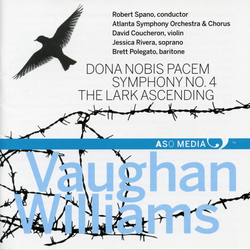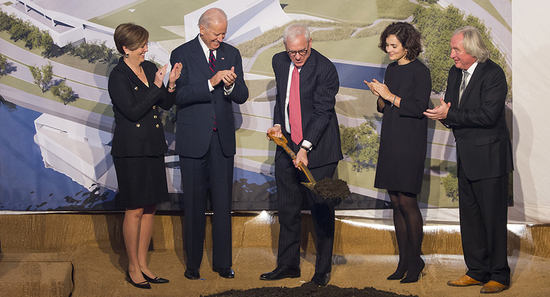ICSOM at the Grammys

On February 8, the St. Louis Symphony’s recording of John Adams’ City Noir won the Grammy Award for Best Orchestral Performance. The recording, with David Robertson conducting, is on the Nonesuch label, and includes two recent Adams compositions: City Noir, and the Saxophone Concerto, featuring soloist Timothy McAllister. Both were recorded live at Powell Symphony Hall in 2013. It is the orchestra’s first Grammy win since 1991, bringing the orchestra’s total to seven.

The Atlanta Symphony Orchestra was associated with Grammy Award number 28, this time the award for Best Engineered Album, Classical, bestowed on Michael Bishop (engineer/mastering engineer) for Vaughan Williams: Dona Nobis Pacem; Symphony No. 4; The Lark Ascending. The featured performers on the recording are Robert Spano, Norman Mackenzie, and the Atlanta Symphony Orchestra and Chorus.
San Francisco Reaches Agreement
On January 31, 2015 the musicians of the San Francisco Symphony ratified a new agreement lasting almost four seasons and expiring in November, 2018. The agreement provides for yearly increases in salary (approximately 14% over four years) and to the defined-benefit pension plan.
Perhaps the most unusual feature of the new agreement is the way it addresses health insurance. The San Francisco Symphony will likely move to self-insurance by the end of the year. The musicians and administration jointly engaged an actuarial consultant who explored the feasibility of self-insurance as a way to moderate the increasing cost of high-quality health care. The parties agreed that his analysis indicated that self-insurance has the potential to provide significant savings in health care costs. With self-insurance, all of the current plan designs (there are four), benefit levels, and musician contributions would remain unchanged for the length of the contract.
The agreement was ratified on the very day the old agreement expired. This was in stark contrast to the last ratification, which came only after a three-week strike and a protracted, rancorous negotiation. After that experience, the musicians and administration worked hard to build a better relationship and achieve a fair agreement on time.
New Music Director at NYCB
Andrew Litton has been appointed the sixth music director of the New York City Ballet Orchestra. The announcement was made on December 16, 2014 by Peter Martins, Ballet Master in Chief. Litton’s tenure will begin in September of this year. While ballet orchestra news, including music director appointments, is generally not a hot topic in the classical music world, this appointment is noteworthy because Litton is such an internationally famous conductor, and it is rare, or perhaps unprecedented, for a conductor of his stature to direct a ballet orchestra.
About the appointment, Litton was quoted in the New York Times: “I think the City Ballet Orchestra are unsung heroes, because they go through more repertoire in a year than most symphony orchestras that I’ve ever encountered. And the number of new pieces that are premiered or done by this orchestra—it’s extraordinary.”
Litton is a native New Yorker and is music director of the Colorado Philharmonic and the Bergen Philharmonic (Norway). In 2013 he was a guest conductor at the City Ballet, leading several performances of Coppelia, with music by Delibes. Based on that brief collaboration, and on his international reputation, the musicians of the New York City Ballet Orchestra are excited about his appointment as their new music director.
Alabama Hires New Music Director
After a search that lasted more than three years, Carlos Izcaray has been appointed Music Director of the Alabama Symphony Orchestra, commencing September 2015. A committee made up of four musicians elected from the orchestra, six board members and two (non-voting) ex-officio executive members of the administrative staff selected Maestro Izcaray from among twenty-eight distinguished candidates who conducted the orchestra during the search process.
The Venezuelan-born Izcaray first trained as a cellist, and served as the Principal Cellist of the Venezuela Symphony Orchestra. Since his appointment was announced, he has already hit the ground running, conducting a Master Series week of concerts and meeting with orchestra musicians and members of the community.
Despite his international conducting career, with his current residence in Berlin and engagements in Thailand, Switzerland, Brazil, Sweden and Colombia, Izcaray is familiar with American culture having reportedly spent his high school years in Wisconsin. The Alabama Symphony Orchestra looks forward to this exciting new chapter, and welcomes Maestro Izcaray.
Lyric’s Tragic Loss
Kenneth G. Pigott, President and CEO of the Lyric Opera of Chicago, passed away suddenly on February 13, 2015. This news came as a shock and profound loss to the entire Lyric Opera. When Pigott became President of the Board in 2011, one of his first actions was a generous one: to meet personally with the orchestra committee, a gesture that exemplified the kind of person he was. There is no doubt he did this with the other unions and departments that make up the Lyric family. Pigott was instrumental in bringing Renee Fleming to Lyric Opera in the position of Artistic Consultant. He was a board member of OPERA America, the Ann and Robert H. Lurie Chicago Children’s Hospital and the Merit School of Music. His generosity with people and support of Lyric and the opera world in general was unsurpassed. He will be greatly missed.
Music Director Musical Non-Chairs
February 2015 was a big month for Music Director announcements. February 6, 12, and 18 saw announcements from the New York Philharmonic, the Milwaukee Symphony Orchestra, and the National Symphony Orchestra, respectively, that each of their current Music Directors, Alan Gilbert, Edo de Waart, and Christoph Eschenbach, would be stepping down from those positions after the end of those orchestras’ 2016-2017 seasons. When they depart, both Gilbert and de Waart will have been Music Director of their orchestras for 8 years, while Eschenbach will have held his post (along with the post of Music Director of the Kennedy Center) for 7 years. Eschenbach and de Waart will both continue their affiliation with their former ensembles as conductors laureate. The next question is whether these three orchestras will announce new Music Director appointments in an equally coordinated time frame.
Festival Shifts to the Kennedy Center
Carnegie Hall’s innovative but short-lived Spring for Music, which featured performances by 23 orchestras over four years, including 16 ICSOM orchestras, has found a revival in Washington, DC. The Kennedy Center, in partnership with Washington Performing Arts (an active and vital organization in Washington’s cultural community), has announced a new initiative, Shift: A Festival of American Orchestras. “The title of the festival, Shift, recognizes the dynamic, evolving work and role of orchestras in the 21st century and underscores our mission to play a role in shifting pre-conceived notions about orchestras,” says Jennie Bilfield, CEO and President of Washington Performing Arts. Beginning in the spring of 2017, four or five orchestras will be selected to perform annually at the Kennedy Center and explore different ways to teach and connect with audiences around the DC metropolitan area. “Just because you put together the most compelling concert program does not guarantee participation if you do not come with other activities,” says Kennedy Center President Deborah Rutter. Shift’s first three years have been secured through a $900,000 grant from the Andrew W. Mellon Foundation, with $700,000 earmarked to match new contributions. “I believe there is a lack of awareness of the scope of programming that takes place by orchestras,” says Rutter. “In the nation’s capital, where we have opinion leaders of all sorts, we can be a platform showcasing this to the rest of the country.”
Kennedy Center Expansion
On December 4th, Vice President Joe Biden led the groundbreaking of the Kennedy Center’s Expansion Project, marking the first modification to the Center’s appearance since it opened 53 years ago. The $100 million project will create more space for arts education, rehearsal rooms, and new places for audiences to experience performances, including a floating pavilion on the Potomac River. There will also be aspects that further memorialize President John F. Kennedy. Other speakers at the ceremony included Rose Kennedy Schlossberg (granddaughter of President Kennedy and new Board of Trustees member), architect Steven Holl, Deborah Rutter, and David Rubenstein (Chairman of the Board of Trustees of the Kennedy Center).

Deborah Rutter, Vice President Biden, David Rubenstein, Rose Kennedy Schlossberg and Steven Holl
Photo credit: Scott Suchman
Rubenstein, who has pledged $50 million for the Expansion Project so far, dug into soil with the same golden shovel used to break ground for the Lincoln and Jefferson Memorials as well as the Kennedy Center’s original construction. The Expansion Project is slated for completion on May 29, 2017, marking the 100th birthday of President Kennedy.
Minnesota to Visit Cuba
Music Director Osmo Vänskä and the Minnesota Orchestra have been invited by the Cuban Ministry of Culture to perform two concerts in Havana this May as part of the International Cubadisco Festival. This means that Minnesota will become the first U.S. orchestra to perform in Cuba since the Milwaukee Symphony Orchestra visited in 1999, and only the second since the Cuban Revolution brought about a break in relations between the two countries. (The Florida Orchestra has had a cultural exchange with Cuba since 2011 that has involved small groups of musicians traveling to Cuba.)
The orchestra is scheduled to depart on May 13 and return to the U.S. on May 17. In addition to offering two performances in Havana, the orchestra will also be looking at opportunities for community engagement activities while in Cuba. Kevin Smith, Minnesota Orchestra CEO, said “This is an extraordinary privilege and opportunity for our Orchestra, and we are enormously grateful to special donors whose generosity is making the tour possible…We offer thanks to Osmo and the musicians, whose willingness to postpone a planned vacation week has made the trip possible in May; to board members who encouraged the concept in its early stages; and to the staff members who have worked so hard to pull this together in a short period of time.”
Buffalo Continues Strong Performance
The Buffalo Philharmonic Orchestra recently announced a balanced budget for the 2013-14 season. Ticket sales have been climbing steadily for a period of time, showing revenue of $3.3 million during the 2013-14 season. This is a 6.2% increase from the previous season, and represents an increase of over $500,000 (18.4%) from the 2010-11 season. This marked the ninth season out of the last ten that the BPO has been able to balance the budget.
Other recent highlights include the release of four recordings during the 2013-14 season. The BPO also successfully performed six concerts on a five-city tour of Florida in February 2014, as well as a performance at Princeton University in July 2014. Over 200,000 people attended performances of the BPO during the 2013-14 season. The season also saw the endowment grow to over $32 million. The goal of a $50 million endowment is in sight, as an additional $10 million is pledged for future years.
The BPO even found a new way to give back to the community, as $15,000 was donated to the campaign for the new Oishei Children’s Hospital, scheduled to open in late 2017 in Buffalo. This money was raised through a “Doctors of the World” concert that was hosted by the BPO in July 2014.
As the BPO looks towards the 2015-16 season, it will mark the 75th anniversary of Kleinhans Music Hall. In the latest phase of renovations to the hall, it was recently announced that new seating would be installed over the summer of 2015. Seating capacity will actually drop from 2,800 seats to 2,400, due to slightly larger seats and more legroom between rows.
Honoring the Rank and File in St. Louis
This has been a most interesting year in St. Louis. The theme of the 2014-2015 season has been Soloists from the Orchestra, with some 50 different orchestra members getting up in front of their colleagues and showing their stuff. The level of playing has been astounding and a source of great pride for all. A cool wrinkle to this is that Music Director David Robertson commissioned an orchestra member to write one of the pieces played. On November 21 a concert on a new series called Music You Know featured a piece no one could possibly know: Beinn na Caillich, or Hill of the Old Woman, Fantasy for Fiddler and Orchestra. The soloist was Becky Boyer, and the composer was St. Louis ICSOM delegate Chris Woehr. It was possibly the first time in the 135 year history of the orchestra that such a commission has occurred. It gets another performance April 12, with an additional 2 or 3 minutes of music at the request of Robertson.
On February 11, after a full year search, a new President and CEO was announced. On July 1, 2015, Marie-Hélène Barnard, Executive Director and CEO of the Handel and Haydn Society in Boston, replaces Fred Bronstein as the head of the St. Louis Symphony. Barnard is a viola da gamba player with extensive legal and executive experience, including the orchestras of Canton, Cleveland, and Philadelphia. Two members of the search committee and co-chairs of the Musicians Council, Katy Mattis and Michael Walk, stated: “We were most impressed with Marie-Hélène’s collaborative nature and global perspective. She has shown herself able to see many sides of an issue, and to think creatively in addressing problems. We believe she will help the St. Louis Symphony to explore new growth opportunities, and will foster the orchestra’s continuing prominence in the artistic world.”






[…] Kennedy Center had chosen Columbia University Professor Steven Holl as the architect. (Note: See “Orchestra Newslets” in the March 2015 issue.) Holl’s previous works include Houston’s Museum of Fine Arts, Dallas’s Stretto House, and […]